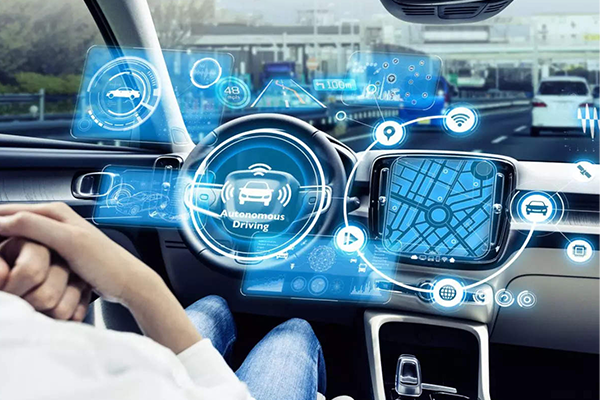
How about having a long ride for thousands of kilometers without driving or paying the driver? Well, in the era of smart cars, everything has become easier with AI and IoT. Different systems work in collaboration for a smooth ride. Playing music and riding to your preferred destination comfortably has become more accessible at the pace of voice.
However, just like smartphones, which aren’t legitimately secure, and amidst hacking documentaries, do you fear that your data is not private? Well, there’s a lot that you should know, so let’s navigate privacy in the age of smart cars. I have covered it all with my expert insights!
Table of Contents
What Data Do Smart Cars Collect?
Smart Cars are no less than connected cars, which are equipped to collect every data. This includes your location, driving habits, the person sitting in your car, and user preferences.
Further, it even records your vehicle data health and tracks the data, which could be more helpful. For instance, if someone is having any sexual activity in the backseat, then smart cars collect this data. Now, this might seem awkward, but they even collect data like your generic composition.
How Smart Cars Use The Collected Data?
Smart cars use this data to customize your car preferences. For instance, if they record the kind of music you listen to, then the system would suggest songs depending on those choices. They even monitor your vehicle health using this data. In a recent test that Mozilla conducted, they reported that out of 25 cars they tested, none complied with the privacy standards.
Moreover, such smart cars even retrieve and leverage their data to distribute to government organizations, advertisements, insurers, and similar industries. Smart Cars rely on the Web2 ecosystem; hence, they even sell this data to tech giants and leading firms for their ventures.
Here’s where there is a crucial phase where smart cards find it challenging to keep the data safe:
Keeping the Data Safe From Unauthorised Access
Smart cars don’t implement enough security measures to protect against data and security breaches. Just like a smartphone or a laptop, these connected cars have various vulnerabilities. These are prone to malicious attacks, computer viruses, denial of service, man-in-the-middle, and such attacks.
Moreover, when cars collect this data, there’s no secure data transmission medium, making it more susceptible to intruder access. Most importantly, it even steals your personal information
Intruders Controlling Smart Cars
A smart car ecosystem relies on digital interoperability. This means that there are different equipment from various companies which ensure interoperability with each other. They all know each other’s information and communicate with a standard protocol. However, each collects data of different categories and doesn’t provide safety against intruders.
As revealed by ExpressVPN, all these companies use it for different purposes and even sell to stakeholders. The worst part is that you cannot be sure who uses the data!
These intruders can hack your car system. Further, they can execute any criminal activity. This includes Controlling your steering wheel, brakes, and gears and even locking your car to prevent you from going out. Thus, your car can even drive you to different locations, data breach threats for the sake of money, and similar.
Smart cars have ECUs, which are required but are also vulnerable from the point of security.
Consequences of Smart Cars Data Collection: Are They A Threat to Privacy?
Yes, smart cars collecting data is not legitimately a mandate, but it causes potential issues in the long run. Some of the crucial aspects where it proves dangerous are stalking, impersonation, kidnapping, and similar. The data that smart cars collect reveal a tremendous amount of information beyond what is required, which even includes personal data.
Hence, more than use, the data that smart cars collect have been misused, and knowing aspects like genetic composition makes no sense.
Do Any Regulatory Bodies Protect Driver Data?
Yes, there are regulatory bodies established worldwide that aim to ensure that the evolution of smart cars does not pose a security threat. Organizations have standards like the California Consumer Privacy Act (CCPA), the European General Data Protection Regulation (GDPR), etc.
Though these have their standards, there is a dire need to obtain data on smart cars. Hence, more regulations and a centralized body dedicated to ensuring that vehicles comply with it stringently are needed.
What Rights and Controls Do Consumers Have Over Their Information in Smart Cars?
There’s an option amongst smart cars to adopt data aggregation techniques with anonymity, which can protect privacy. Some of the smart cars eliminate the personal data that is not needed and hence don’t combine it with the required datasets.
It’s noteworthy that about 92% of the connected cars grant negligible to no control to consumers over their data. Amongst the brands available, Renault and Dacia (the offsprings of a common parent company) give consumers the right to delete data.
However, this is only feasible in the short run as cars are only available in Europe. Further, these abide by the General Data Protection Privacy regulations as well.
All but two of the 25 car brands we reviewed earned our “ding” for data control, meaning only two brands, Renault and Dacia (which are owned by the same parent company), say that all drivers have the right to have their data deleted.
To sum up, smart cars don’t give consumers much control over their data. They use it in whichever way they want!
How To Ensure Data Privacy in Smart Cars?
Currently, smart car users don’t have any control over their data privacy. It’s only when the industry commits to data security measures to create and adapt to digitally interoperable systems without compromising data privacy. It even needs to safeguard the Internet of Things ecosystem to prevent threats.
One of the strategies that industries can adopt is the Web5 model of the internet for giving control to users over their data.
Below are how companies can ensure data security and innovation:
1] Robust Industry Standards
Digital interoperability is centralized in the smart car ecosystem. However, there are no industry-recognized compliant standards or mandatory practices to secure data collected via connected cars.
There are regulations like the GDPR in Europe and CCPA in California, which state rules for handling this data. Companies must ensure to abide by its laws effectively.
Further, even the Alliance for Internet of Things Innovation (AIOTI) has introduced security and privacy standards. These will help prevent data breaches for IoT systems used in connected cars. This will mitigate cyber attacks.
Besides the Automotive Grade Linux is also establishing standards that smart car industries must adapt for security. But it’s still under development.
2] Safe Connections
Smart cars operate in media like WiFi or cellular data connections like the 4G or 5G networks. Therefore, ensure that your network is secure from intruders and will keep your data safe during transmission.
3] Introduce In-built Security Measures
Smart car manufacturers collaborate with tech experts for innovation and efficient build. However, they should also team up with experts who help them design cars considering the security measures. These strategies must also ensure that consumers have control over their data. Some methods include encryption standards, audits to keep track of security hacks, and using advanced technology like Web5 to provide further control over the data.
Thus, tech manufacturers can ensure that consumers’ data remains safe.
The Final Word
If you were looking at privacy in the age of smart cars, then you would have got your answer! Smart Cars rely on digital interoperability and collect every bit of your data like user preferences, exact location, driving habits, sexual orientation, and genetic composition. If you are someone who thinks that some of it isn’t essential for them to collect, then you are somewhat correct.
However, the significant risk is that intruders access it during transmission, and companies sell it to intruders. Hence, there is a strict need for companies to comply with GDPR CCPA and give users greater control over their data.

